28
July 2025
28
July 2025
Event Summary | Youth Moving Beyond GDP: Intergenerational Equity to Finance What We Value

Official Side Event at the 4th International Conference on Financing for Development (FfD4) "Youth Moving Beyond GDP: Intergenerational Equity to Finance What We Value"
To access full recommendations, click here.
Our world is increasingly shaped by the consequences of growth at all costs—rising inequality, ecological breakdown, and the erosion of prospects. It is no longer enough to let GDP alone as a dominant indicator define our progress and development. At the Fourth International Conference on Financing for Development (FfD4) in Seville-Spain, a powerful and future-shaping conversation unfolded. The partners of the “Youth Moving Beyond GDP” initiative, the Beyond Lab, Rethinking Economics International, and UN Trade and Development (UNCTAD), in partnership with their co-organizers the International Institute for Sustainable Development (IISD); the Government of Canada’s International Development Research Centre (IDRC); the UN Youth Office; the Office of the UN High Commissioner for Human Rights (OHCHR); and the Governments of Germany and Zambia, convened a vibrant side event on “Youth Moving Beyond GDP: Intergenerational Equity to Finance What We Value.” The session was not only a deep dive into the limitations of GDP as a measure of progress and development in a comprehensive way, but also a bold call to action: It’s time to reimagine the metrics, systems, and principles underpinning the way we not only measure what we value, but also how finance it.
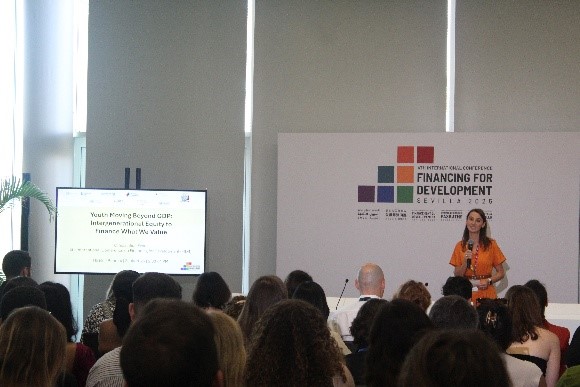
Attended by over 80 people in-house, the event was also live streamed through our YouTube channel to a global audience, with the intention to bring the people to the conference and the conference to the people. The session aimed to challenge the outdated GDP driven development paradigm and explore how we can build economic and financial systems that measure and finance what truly matters to create well-being for people and planet, with inter-generational equity at the heart of it. Moderated by Nathalie Delorme of Beyond Lab, the session outlined the limits of GDP as an indicator of well-being. GDP continues to dictate access to financing and policy priorities—yet it ignores the social and environmental dimensions essential for sustainable development. At this pivotal moment in global financing debates, young people are not only inheriting the consequences—they are leading the charge for change.
The event brought together youth experts, policymakers, and diverse stakeholders to collectively imagine what it means to go beyond GDP and reframe the way we measure success, what we finance, and ultimately, what we value in an intergenerational, just, and future-ready way.
The opening segment began with a bold premise: GDP does not capture development and well-being in a comprehensive way. It does reflect what creates true value for people and the planet, today and for generations to come. With polycrisis unfolding, the time to shift is now.
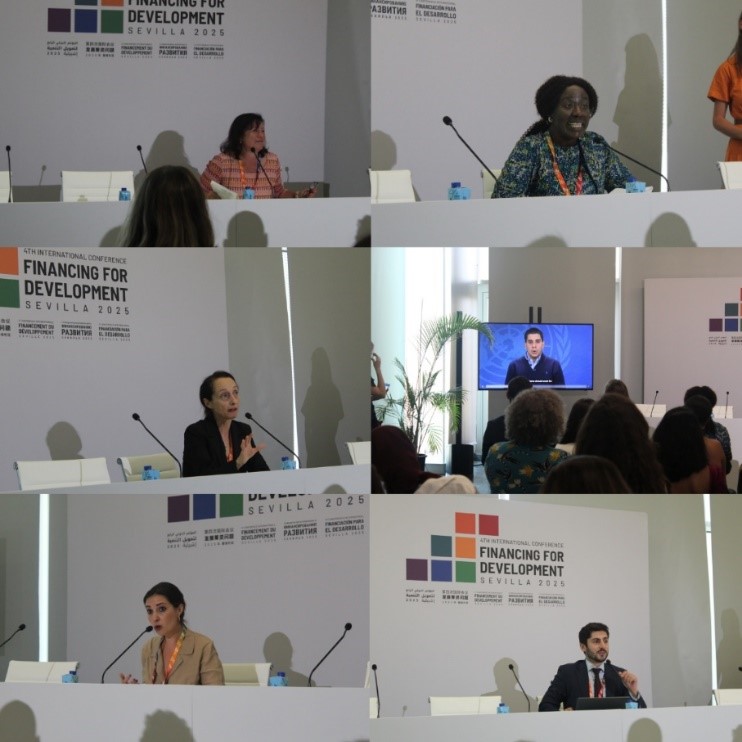
Dr. Bärbel Kofler, Parliamentary State Secretary to Germany’s Federal Minister for Economic Cooperation and Development, delivered a powerful message in this regard: In an era of growing complexity and transformation, she emphasized the need for systemic change driven by creative thinking and intergenerational dialogue. Drawing on her political experience, she noted that while change can be uncomfortable, maintaining the status quo is no longer viable. Dr. Kofler underscored GDP’s limitations—while powerful, it fails to reflect critical dimensions like inequality, environmental health, and social cohesion. Referring to Action 53 of the UN Pact for the Future, she urged the audience to question whether GDP is fit for purpose to be the sole metric of reference in today’s world to judge the merits of all kinds of policies, including development or wellbeing. Her answer: it’s not.
Dr. Kofler highlighted the urgency of adopting alternative indicators that better capture well-being, equity, and sustainability. Highlighting Germany’s support for rethinking development measurement, she applauded the growing momentum behind the UN Secretary-General's High-Level Expert Group on Beyond GDP and welcomed the fact that youth are helping to lead this agenda. Acknowledging that while adopting new metrics, and implementing policies based on them, at the political level is always challenging, it is essential for making policy decisions that are evidence-based, inter-generationally equitable, inclusive, and socially accepted. Closing with optimism, she pledged Germany’s continued commitment: “The insights you bring will shape tomorrow’s decisions—and I hope to be part of the team that brings them to life.”
Ms. Prudence Kaoma, Permanent Secretary in the Zambia’s Ministry of Finance and National Planning, delivered a powerful statement highlighting the urgent need to shift global financial thinking beyond GDP. She emphasized that the current system excludes the most vulnerable—especially youth in Least Developed Countries (LDCs), where over 60% of the population is under 30. Rather than seeing this as a demographic burden, she called it a dividend waiting to be unlocked.
She challenged the audience to move from incremental change to transformative action, noting that GDP does not capture what truly matters—access to clean water, climate resilience, opportunity for young entrepreneurs, and the dignity of people and the planet. Kaoma called for:
Reaffirming her support, Ms. Kaoma celebrated the launch of the Youth Network for Beyond GDP as a critical platform for youth leadership in redefining global finance. She ended with a strong moral call: moving beyond GDP is not optional—it is a matter of justice and intergenerational solidarity.
The momentum was echoed by H.E. Ms. Mónica Colomer de Selva, Spain’s Ambassador-at-Large for Financing for Development, who affirmed Spain’s commitment to advancing intergenerational equity as a pillar of the Beyond GDP agenda. GDP may measure economic output, she noted, but it fails to reflect the real needs and vulnerabilities of people and the planet. “We need new metrics that include the value of care, reflect inequality, and measure what really makes life flourish,” she said.
In a passionate video message, Dr. Felipe Paullier, UN Assistant Secretary-General for Youth Affairs, reminded the room that “young people are not waiting for permission—they are already shifting power.” He called for development finance to serve people and planet—not just profit—and urged institutions to embed youth as co-creators, not token participants. “The world is calling out,” he said. “Let’s make sure youth are helping answer.”
Building on this, Ms. Özge Aydoğan, Director of Beyond Lab at UN Geneva, asked the audience to confront a simple but profound truth: GDP was never designed to measure what we care about. With emotion and urgency, she challenged extractive models of development and reminded participants that future generations are not in the room—but must still be represented. “Intergenerational equity should not be an afterthought—it should be a central design principle,” she said. “Let’s move from extractivism to regeneration. From exclusion to inclusion. From GDP to measuring what we truly value, for us, as humans, in balance with the planet, our home.”
The segment closed with a powerful intervention from Mr. Alexandre Pupo, Secretary-General of the Organismo Internacional de Juventud para Iberoamérica (OIJ). He did not mince words: “No one eats GDP—people eat food.” Speaking for youth across Ibero-America, he condemned the hypocrisy of development systems that praise youth engagement but direct less than 0.12% of global aid to youth-led initiatives. He called for a redefinition of development centered on dignity, not debt—on justice, not just growth. “There will be no sustainable development,” he warned, “without real investment in youth.”
Together, these opening voices reframed the conversation. This is not just about fixing GDP—it’s about redefining value, reimagining systems, and reclaiming the present and the future. And at the heart of that vision is inter-generational equity and young people leading the way.
With the stage set and the urgency clear, the first panel of the event dove headfirst into the question of why GDP is still the dominant measure of progress—and what is it failing to tell us?
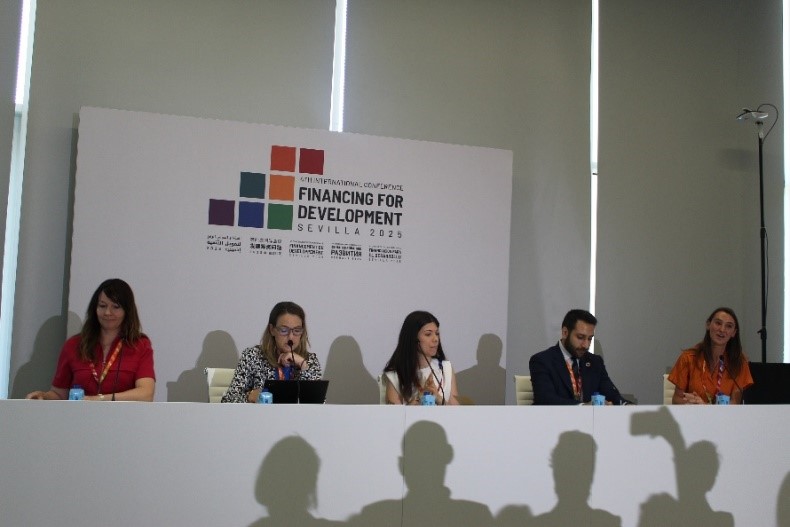
Beginning with Mr. Antoine Kallab, Associate Director at the Nature Conservation Center of the American University of Beirut, who offered a pointed critique. “Young people care about what everyone cares about—justice, equity, and a future they can count on,” he said. Yet GDP, as currently constructed, tells a distorted story. Drawing on Lebanon’s economic collapse, he illustrated how official GDP figures masked deep structural fragility. “From $53 billion to $20 billion overnight—GDP didn't just miss the signs. It actively misled us.” Mr. Kallab called for a two-pronged solution: holistic internalization of externalities like climate and health, and the integration of qualitative indicators— grounded in what communities value.
From Brazil, Ms. Georgia Gadotti dos Anjos of Economistas Sin Fronteras brought both analysis and lived experience. GDP, she argued, is not just inadequate—it’s a colonial construct. “It was never designed to reflect the realities of marginalized communities,” she said. Growing up in southern Brazil, she witnessed the brutal contrast between privilege and exclusion: private healthcare for some, long lines at overburdened public clinics for others. “GDP hides this. It makes it invisible.” Instead of reducing society to a single number, she called for centered inclusion—where marginalized communities don’t just participate, but shape what is measured and why.
Ms. Erin Tansey, Director of Sustainable Inclusive Economies at the International Development Research Centre (IDRC), offered a pragmatic yet hopeful perspective. Her team has funded research across Indonesia, Ethiopia, and Trinidad to test the feasibility of comprehensive wealth indicators—and the results are in: “It is possible.” Though slow and complex, data systems can be built to reflect care, sustainability, and equity. She celebrated the emergence of physical and symbolic spaces—like the Care Pavilion at FfD4—that elevate often-invisible economies like caregiving. “We need data tools that policy makers can use—but we also need storytellers who can give that data meaning.”
Closing the panel, Ms. Anu Peltola, Director of Statistics at UNCTAD, offered a candid reflection from inside the statistical system itself. “As a statistician, I feel deeply responsible for the shortcomings of the numbers we’ve relied on,” she said. While GDP is a robust and globally adopted measure, it was never designed to reflect well-being, sustainability, or equity. She pointed to the updated System of National Accounts 2025—now beginning to recognize informal and care economies—as a step forward, but not nearly enough. What’s needed now is a common global vision, she said—one that doesn’t just measure quantity, but the quality of growth, the sustainability of progress, and the true value it brings to people and the planet.
In a moment of collective reflection, panelists listed these are the things most needed to go beyond GDP: Education and Activism, Strong Partnerships, and Solidarity. Their answers rang clear: crafting a better present and future requires not just new indicators, but a new mindset and way of thinking, new politics, and a new commitment to co-creation.
As the discussion evolved from diagnosing the limitations of GDP to envisioning alternatives, the second panel tackled the heart of the matter: what practical steps can institutions, governments, and young leaders take to shift from growth-at-all-costs to a model that truly serves people and planet?
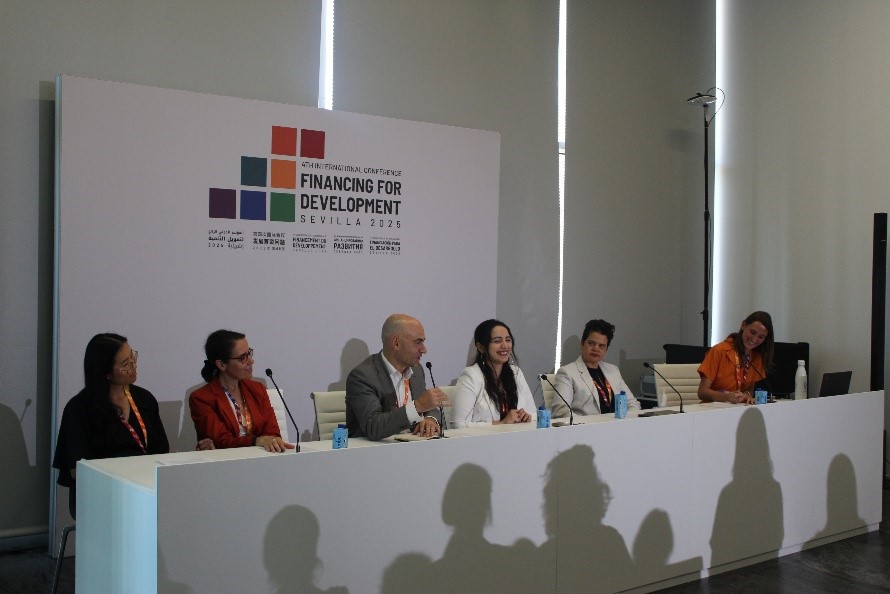
Ms. Noemí Espinosa Madrid, Secretary General of the Association of Caribbean States, opened with a powerful regional call to action. In the Greater Caribbean, where nearly half the population is under 25, the demographic dividend remains an untapped force. She made a clear case: development must be rooted in dignity and human rights, investing in social protection, healthcare, education, and gender equality. She emphasized that intergenerational equity must begin today, by funding women- and youth-led initiatives and offering young people real decision-making power—not just symbolic inclusion. Equally urgent was her call to move beyond GDP per capita by incorporating multidimensional vulnerability indicators that capture the Caribbean’s unique exposure to climate shocks, debt burdens, and social fragilities.
Ms. Amal Ridene, climate finance and policy specialist, emphasized the need to nurture youth innovation while challenging systemic inertia. Drawing from grassroots experiences in North Africa, she shared examples of peer-led platforms that simplify access to funding and trust-based development. Yet, Ms. Ridene reminded the audience that no amount of innovation can succeed if the broader financial system remains unyielding. She called for institutional flexibility, capacity building focused on adaptability, and public budgets that prioritize care and long-term resilience over short-term, quantifiable returns.
From the academic front, Mr. Borja Santos Porras of IE School of Public and Global Affairs underscored that development is not a one-size-fits-all concept. Through an interactive classroom experiment, he illustrated how definitions of “progress” vary depending on cultural, social, and personal lenses. He laid out an evolution of development thinking—from GDP to human development, to environmental sustainability, and finally to dignity and intergenerational justice. His message: metrics must evolve to reflect what truly matters to societies, and each country must shape its own indicators based on context, values, and voice.
Ms. Marcella Favretto, Chief of Sustainable Development Section at the UN Office of the High Commissioner for Human Rights introduced the Human Rights Economy as both a vision and a legal imperative. She argued that development financing must be grounded in existing human rights obligations—from tax systems to public budgets to gender equality policies. Ms. Favretto proposed using legally binding rights through the human rights economy as the compass to redefine economic success and highlighted the importance of investing in citizen-generated data and forging new alliances between national human rights institutions and statistical offices. “It’s not just about creating new standards,” she noted, “but applying those we already have.”
Finally, Ms. Bing Lou of the International Institute for Sustainable Development (IISD) offered three strategic levers for transformation: Collaboration across sectors and institutions, knowledge-building to harness existing data in new, holistic ways, and priority-setting that helps governments align investments with long-term sustainability goals. Drawing on IISD’s research from Trinidad and Tobago, she highlighted the disconnect between rising GDP and declining comprehensive wealth due to natural capital loss—evidence that without measuring sustainability, growth is just a mirage.
In closing, each speaker shared two key points they believe should give us hope and pragmatic optimism signaling that the shift is happening (albeit not in a linear way!), and that the world is indeed moving beyond GDP: Women’s empowerment—especially young women, youth, determination; mobilization to reclaim how we common futures.
The closing moments of the side event sparked a new chapter in the global effort to transform economic and financial systems beyond the currently prevailing GDP and extractive growth paradigm. Demonstrating that collaboration can drive collective action, Ms. Özge Aydoğan (Director, Beyond Lab at UN Geneva), Mr. Laurence Jones-Williams (Executive Director, Rethinking Economics International), and Ms. Anu Peltola (Director of Statistics, UNCTAD) announced the official launch of the Youth Network for Beyond GDP—a new platform created to ensure that youth are not just included in but are co-creators of economic transformation.
This platform, inter alia, aims to:
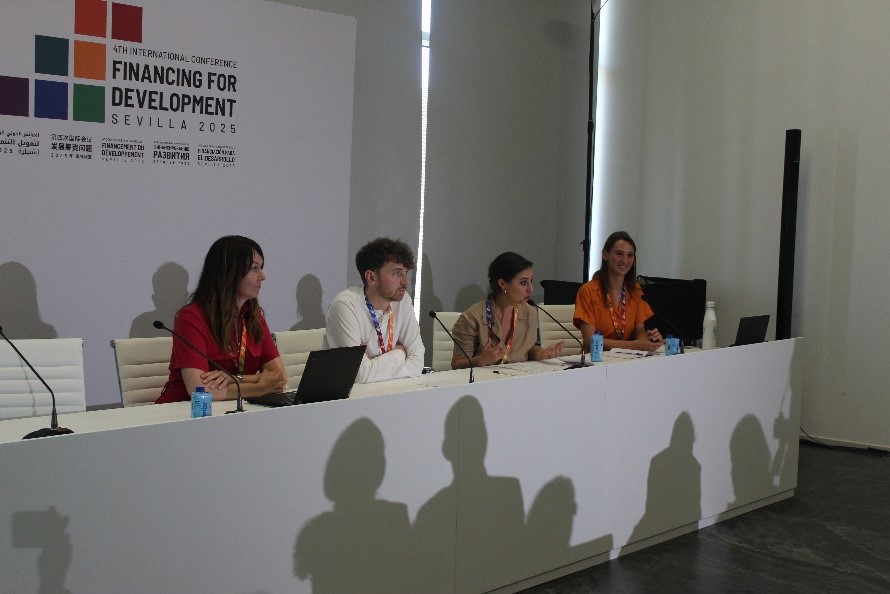
Framed by Ms. Noemí Espinosa Madrid’s earlier challenge—“Are we truly committed to this?”—the answer came with resounding clarity: Yes. And we’re building the infrastructure and movement to prove it.
Ms. Özge Aydoğan from the Beyond Lab emphasized that the Youth Network was born out of a joint commitment to intergenerational equity and systems transformation. The network will serve as a transformative platform connecting youth voices with intergovernmental processes, expert groups, and global economic dialogues, such as the UN High level expert group on Beyond GDP or the Global Beyond GDP Alliance. It aims to ensure that what young people value—justice, sustainability, care, dignity—is reflected in economic and financial frameworks that govern our collective well-being in the present and the future.
Mr. Laurence Jones-Williams from Rethinking Economics International added urgency to the moment, calling for a move beyond tokenism. “Young people must not be passengers in this process—we are here to hold them accountable,” he declared. With a mission to reshape how development is measured and understood, the Youth Network will contribute directly to global policy dialogues, including the UN High-Level Expert Group on Beyond GDP, provide education and leadership on economic alternatives for youth networks worldwide, Institutionalize intergenerational equity as a core principle in economic system design. Already, the Youth Network has started building momentum since it was sparked by a joint youth Essay Competition that received over 600 submissions in 2024—a clear signal of care among young people for this important topic, and rising demand for new narratives, new tools, and a new economic compass and re- prioritizing investment that finance what creates value for people and the planet .
Ms. Anu Peltola reminded the audience that this initiative is also embedded within the broader Beyond GDP Global Alliance, a multi-stakeholder platform announced earlier at FfD4. The youth network will play a key role in ensuring youth perspectives remain central as this alliance advances toward policy and measurement reform.
In her final remarks, Ms. Aydoğan offered heartfelt thanks to partners, particularly the governments of Germany, Zambia, and Spain, for championing this bold step forward, but also the Government of Switzerland for its long-standing support to the Beyond Lab and its work on rethinking economic systems. “Too often, innovations remain small because we fail to scale them. Today, we are scaling up. Today, we are connecting. Because change happens through collective action.”
The moment culminated in an invitation for all participants to join the movement, marking not just the end of an event but the beginning of a youth-powered push to move beyond GDP and finance what we truly value.
Watch the full official side event “Youth Moving Beyond GDP: Intergenerational Equity to Finance What We Value” here: